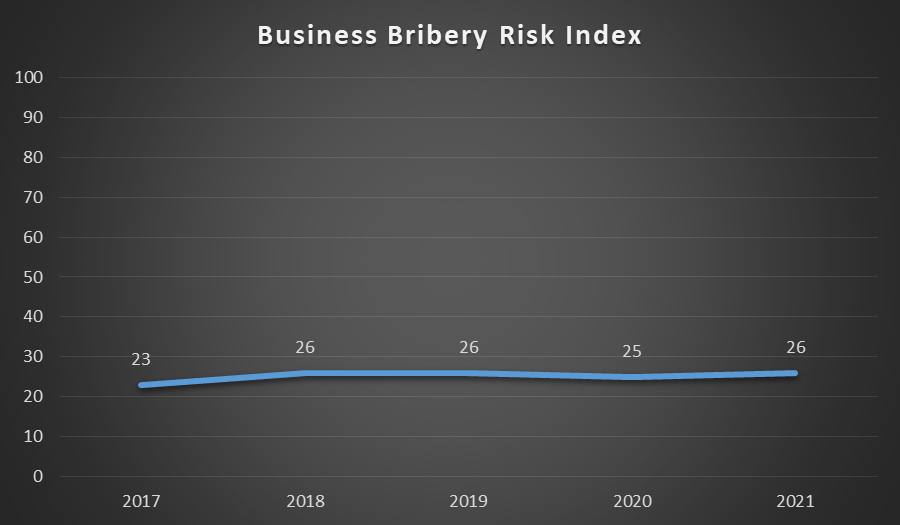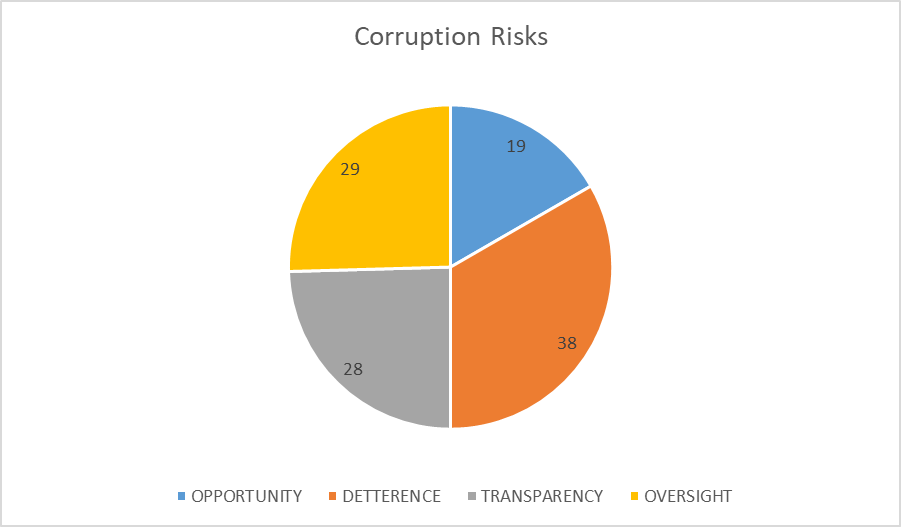


Trace International released new Business Bribery Risk Index on November 17. The organization assessed the risk of business corruption in 194 countries. It used a 100-score system where 100 points indicate a high and 0 point - low risk of corruption. According to the 2021 data, Georgia ranks 29th among 194 countries with business bribery risk score of 26. This is a worsened indicator compared to 2020 when Georgia ranked 28th among 194 countries with 25 points of business bribery risk. In 2019 as well as in 2018 Georgia ranked 27th among 200 countries with the score of 26. For the last five years, Georgia got the best result in 2017, when it was ranked 25th with 23 points among 200 countries. These data show that business bribery risk is increasing gradually.

At the international level the lowest risk of corruption in business is detected in Denmark, so with two points it stands first in the ranking. The highest risk of business bribery was revealed in North Korea, which ranks last - 194th with 94 points.
The TRACE Bribery Risk Matrix examines the nature of corruption in the following four areas:
DOMAIN 1: OPPORTUNITY - considers the business interaction with the government, the expectation of paying a bribe to the government and the burden of regulation. It should be noted that in INTERACTION - one out of the three components of OPPORTUNITY domain - Georgia received the best score of 1 and took the first place in the component. Overall, Georgia has 19 points in this domain. Out of the four directions assessed, in Georgia, the lowest corruption risk was observed in this domain. However, it is noteworthy that this indicator is worsened compared to 2020, when Georgia had 17 points.
DOMAIN 2: OPPORTUNITY - considers the business relationship with the government, the expectation of paying a bribe to the government and the burden of regulation. Georgia has 19 points in this domain. Out of the four directions assessed, in Georgia, the lowest corruption risk was observed in this domain. However, it is noteworthy that this indicator is worsened compared to 2020, when Georgia had 17 points.
DOMAIN 3: DETERRENCE - refers to the Anti-Corruption policy pursued by the government and the public's attitude towards bribery. Although, compared to the previous year, out of the four areas assessed, Georgia showed a slightly improved rate only in deterrence, the country’s corruption risk index in this direction still is the highest among the four domains. It is evaluated with 38 points. In 2020 Georgia had 39 points in this domain.
DOMAIN 4: TRANSPARENCY - examines good governmental and financial transparency. Georgia received 28 points. This indicator is worsened by two points compared to 2020.
DOMAIN 4: OVERSIGHT - considers the quality of media and its freedom as well as the involvement of the public. In this direction, Georgia has 29 points. In 2020 the country was assessed with 28 points in this domain.
Out of these four domains, Georgia has the lowest score in terms of OPPORTUNITY and, consequently, the lowest risk is noted in this area. The highest risk and, consequently, the highest score was observed in the direction of DETTERENCE. As for TRANSPARENCY and OVERSIGHT, Georgia got almost equal points (respectively, 28 and 29 points).

According to the Business Bribery Risk Index 2021 by Trace International, top five countries with the lowest corruption risks are Denmark, Norway, Sweden, Finland, and New Zealand. As for Georgia's neighboring countries and the region of Eastern Europe, the Czech Republic received the best score and took the 39th place with 31 points, while the highest risk was observed in Belarus. With 58 points Belarus ranked 144th in the international ranking.
___

This material has been financed by the Swedish International Development Cooperation Agency, Sida. Responsibility for the content rests entirely with the creator. Sida does not necessarily share the expressed views and interpretations.